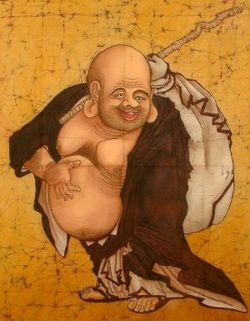Difference between revisions of "Laughing Buddha"
| Line 1: | Line 1: | ||
[[File:LaughingBuddha.jpg|thumb|250px|]] | [[File:LaughingBuddha.jpg|thumb|250px|]] | ||
| − | The so-called laughing [[Buddha]] is a [[character]] popular in {{Wiki|Chinese}} and {{Wiki|Japanese}} folk [[belief]] and has its origins in a welding together of the identities of semi-historical [[monk]] Che’tz and the [[bodhisattva]] [[Maitreya]] ({{Wiki|Chinese}} [[Mile pusa]]). Che’tz lived in 10th century [[China]] and was widely loved for his eccentric {{Wiki|behaviour}}, his way with children and in particular, his open, friendly [[manner]]. He was also very obese and used to carry a bag full of knickknacks over his shoulder, for which he was also known as ‘Big Bag [[Monk]]’ (Buti’shang). In later centuries, popular [[imagination]] came to identify Che’tz with [[Maitreya]], the [[Buddha]] of the next {{Wiki|era}}, probably because Maitreya’s [[name]] means ‘The Loveable One’ and he too was [[thought]] of as [[being]] a friendly, benign {{Wiki|individual}}. Eventually, [[Maitreya]] came to be depicted like Che’tz; bald-headed, rotund, and broadly smiling or laughing. Although learned {{Wiki|Chinese}} [[Buddhists]] always distinguished between the two, the majority of simple folk did not, and gradually looked upon Che’tz/Maitreya as a [[god]] of prosperity, abundance and good [[luck]]. | + | The so-called laughing [[Buddha]] is a [[character]] popular in {{Wiki|Chinese}} and {{Wiki|Japanese}} {{Wiki|folk}} [[belief]] and has its origins in a welding together of the {{Wiki|identities}} of semi-historical [[monk]] Che’tz and the [[bodhisattva]] [[Maitreya]] ({{Wiki|Chinese}} [[Mile pusa]]). Che’tz lived in 10th century [[China]] and was widely loved for his {{Wiki|eccentric}} {{Wiki|behaviour}}, his way with children and in particular, his open, friendly [[manner]]. He was also very obese and used to carry a bag full of knickknacks over his shoulder, for which he was also known as ‘Big Bag [[Monk]]’ (Buti’shang). In later centuries, popular [[imagination]] came to identify Che’tz with [[Maitreya]], the [[Buddha]] of the next {{Wiki|era}}, probably because Maitreya’s [[name]] means ‘The Loveable One’ and he too was [[thought]] of as [[being]] a friendly, benign {{Wiki|individual}}. Eventually, [[Maitreya]] came to be depicted like Che’tz; bald-headed, rotund, and broadly smiling or laughing. Although learned {{Wiki|Chinese}} [[Buddhists]] always distinguished between the two, the majority of simple {{Wiki|folk}} did not, and gradually looked upon Che’tz/Maitreya as a [[god]] of {{Wiki|prosperity}}, abundance and good [[luck]]. |
| − | In some ways the so-called laughing [[Buddha]] is similar to Saint Nicolas in the {{Wiki|Christian}} [[tradition]]. He was an entirely legendary [[character]] who later became a {{Wiki|saint}} in the Church and eventually evolved into Santa Claus, a friendly old man who dispenses gifts to good children. | + | In some ways the so-called laughing [[Buddha]] is similar to [[Saint]] Nicolas in the {{Wiki|Christian}} [[tradition]]. He was an entirely legendary [[character]] who later became a {{Wiki|saint}} in the {{Wiki|Church}} and eventually evolved into Santa Claus, a friendly old man who dispenses gifts to good children. |
{{R}} | {{R}} | ||
[http://www.buddhisma2z.com/content.php?id=224 www.buddhisma2z.com] | [http://www.buddhisma2z.com/content.php?id=224 www.buddhisma2z.com] | ||
Revision as of 11:41, 17 September 2013
The so-called laughing Buddha is a character popular in Chinese and Japanese folk belief and has its origins in a welding together of the identities of semi-historical monk Che’tz and the bodhisattva Maitreya (Chinese Mile pusa). Che’tz lived in 10th century China and was widely loved for his eccentric behaviour, his way with children and in particular, his open, friendly manner. He was also very obese and used to carry a bag full of knickknacks over his shoulder, for which he was also known as ‘Big Bag Monk’ (Buti’shang). In later centuries, popular imagination came to identify Che’tz with Maitreya, the Buddha of the next era, probably because Maitreya’s name means ‘The Loveable One’ and he too was thought of as being a friendly, benign individual. Eventually, Maitreya came to be depicted like Che’tz; bald-headed, rotund, and broadly smiling or laughing. Although learned Chinese Buddhists always distinguished between the two, the majority of simple folk did not, and gradually looked upon Che’tz/Maitreya as a god of prosperity, abundance and good luck. In some ways the so-called laughing Buddha is similar to Saint Nicolas in the Christian tradition. He was an entirely legendary character who later became a saint in the Church and eventually evolved into Santa Claus, a friendly old man who dispenses gifts to good children.
